I'm having a hard-time debugging a stored procedure called from BizTalk.
In a prior thread, someone suggested using sp_trace_generateevent. [Use SQL Debugger when stored proc called by an external process
Since I need to display a variable, I came up with the following, and it works, I can see the value in SQL Profiler (with EventClass=UserConfigurable:0"
Declare @message nvarchar(128)
Set @message = 'Hello World 2 '
exec sp_trace_generateevent @event_class=82, @userinfo = @message
But when I put it in a "BEGIN CATCH" in the problem stored proc, I don't see anything in the profiler:
BEGIN CATCH
DECLARE @message nvarchar(128)
SET @message = LTRIM(STR(ERROR_MESSAGE()))
exec sp_trace_generateevent @event_class=82, @userinfo = @message
SET @CatchErrors =
'Catch: [LTL].[CreateShipment] - ErrorNumber: '+LTRIM(STR(ERROR_NUMBER()))
+ ' ErrorSeverity: '+LTRIM(STR(ERROR_SEVERITY()))
+ ' ErrorState: '+LTRIM(STR(ERROR_STATE()))
+ ' ErrorProcedure: '+LTRIM(STR(ERROR_PROCEDURE()))
+ ' ErrorLine: '+LTRIM(STR(ERROR_LINE()))
+ ' ErrorMessage: '+LTRIM(STR(ERROR_MESSAGE()))
END CATCH
So then I put a Catch within the Catch:
BEGIN CATCH
BEGIN TRY
DECLARE @message nvarchar(128)
SET @message = LTRIM(STR(ERROR_MESSAGE()))
exec sp_trace_generateevent @event_class=82, @userinfo = @message
END TRY
BEGIN CATCH
SET @Message = 'Error in sp_trace_generateevent'
END CATCH
SET @CatchErrors =
'Catch: [LTL].[CreateShipment] - ErrorNumber: '+LTRIM(STR(ERROR_NUMBER()))
+ ' ErrorSeverity: '+LTRIM(STR(ERROR_SEVERITY()))
+ ' ErrorState: '+LTRIM(STR(ERROR_STATE()))
+ ' ErrorProcedure: '+LTRIM(STR(ERROR_PROCEDURE()))
+ ' ErrorLine: '+LTRIM(STR(ERROR_LINE()))
+ ' ErrorMessage: '+LTRIM(STR(ERROR_MESSAGE()))
END CATCH
And now I can see "SET @Message = 'Error in sp_trace_generateevent' " in the profiler, but I really need to see the reason for the error.
The problem I've having cannot be reproduced when testing in SSMS, only when I call from BizTalk. My intent is to bubble the @CatchErrors (as an output parameter) back to BizTalk, but it's not working either.
Also - BizTalk is running with a user that has SQL SysAdmin (it's on my development machine).
Also same result when using master..sp_tracegeneratedevent
Based on @Jeroen's reply, I switched to this, but still getting some error caught.
DECLARE @message nvarchar(128)
BEGIN TRY
SET @message = Convert(nvarchar(128),SUBSTRING(ERROR_MESSAGE(),1,128))
exec sp_trace_generateevent @event_class=82, @userinfo=@message
END TRY
Update #1: This is driving me batty. When I test in SQL it works, but when I test from BizTalk it doesn't. So I really want a debug feature. I now have catch on my catches on my catches... and they are all catching and I don't know why. Same code works fine in the divide by zero simple example. To further complicate, this is a stored proc, called by a stored proc, called by BizTalk. If I catch the error, I should be able to return it to BizTalk in the output parameter called @CatchErrors in my main and sub-stored proc.
BEGIN CATCH
DECLARE @message nvarchar(128)
BEGIN TRY
SET @message = Convert(nvarchar(128),SUBSTRING(ERROR_MESSAGE(),1,128))
exec sp_trace_generateevent @event_class=82, @userinfo=@message
END TRY
BEGIN CATCH
SET @Message = 'Error in sp_trace_generateevent'
END CATCH
BEGIN TRY
SET @CatchErrors =
'Catch: [RG].[CreateShipment] - ErrorNumber: '+CAST(ERROR_NUMBER() AS VARCHAR(35))
+ ' ErrorSeverity: '+CAST(ERROR_SEVERITY() AS VARCHAR(35))
+ ' ErrorState: '+CAST(ERROR_STATE() AS VARCHAR(35))
+ ' ErrorProcedure: '+CAST(IsNull(ERROR_PROCEDURE(),'') AS VARCHAR(200))
+ ' ErrorLine: '+CAST(ERROR_LINE() AS VARCHAR(35))
+ ' ErrorMessage: '+CAST(ERROR_MESSAGE() AS VARCHAR(4000))
END TRY
BEGIN CATCH
BEGIN TRY
SET @Message = 'Error in Set @CatchErrors='
SET @CatchErrors =
'Catch: [LTL.CreateShipmentStopLineItem]- Error: ' + CAST(ERROR_MESSAGE() AS VARCHAR(4000))
END TRY
BEGIN CATCH
SET @Message = 'Error in Set @CatchErrors2'
END CATCH
END CATCH
END CATCH
Update #2 - Testing in SSMS:
I'm testing in SSMS, and none of the catches have issues. If i run this more than once it gets Violation of Primary Key in the Print statement.
Declare @shipstopline LTL.TT_ShipmentStopLineItem
DECLARE @messageID bigint
DECLARE @CatchErrorsResult varchar(max)
insert into @shipstopline values ('2', '1', 'Eggs','1','2','3','1','100','1','12','1','1','1','10','20','1')
EXEC LTL.CreateShipmentStopLineItem @MessageId = 2, @ShipmentStopID=1, @CreateBy=108004, @ShipmentStopLineItem=@shipstopline, @loopid=1, @catchErrors=@CatchErrorsResult OUT
select RowCreated, * from LTL.ShipmentStopLineItem order by LTL.ShipmentStopLineItem.RowCreated desc
print @CatchErrorsResult

